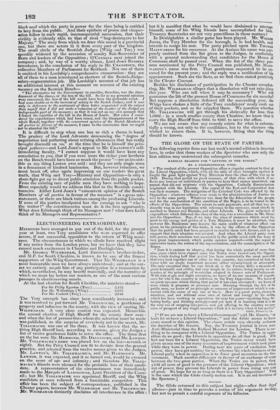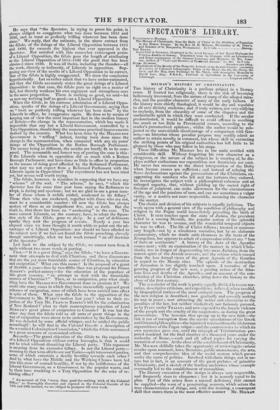The Globe returned to this subject last night—after four days'
silence—just in time to provoke a notice of his argument to-day, but not to permit a careful exposure of its fallacies. He says that "the Spectator, in trying to prove his point, is always obliged to exaggerate what was done between 1815 and 1830, and to treat as perfectly trifling whatever has been done since," We reply, that the estimate, in the above extract from the Globe, of the doings of the Liberal Opposition between 1815 and 1830, far exceeds the highest that ever appeared in the Spectator. Not satisfied with this somewhat extravagant praise of a Liberal Opposition, the Globe goes the length of attributing to the Liberal Opposition of 1815-1830 the good that has been obtained since 1830. It was all theirs, including the thunder—all the work, directly or indirectly, of Liberals in opposition. Sup- posing our view of the merits of a Liberal Opposition to be correct, that of the Globe is highly exaggerated. We draw the conclusion hypothetically. Let us rather admit that we have under-estimated, and that the Globe accurately states the great doings of a Liberal Opposition : in that case, the Globe puts us right on a matter of fact, but thereby weakens his own argument and strengthens ours in the same proportion. There is nothing so good, we said—let us now say nothing half so good—as a Liberal Opposition. When the Globe, in his extreme admiration of a Liberal Oppo- sition, speaks of the doings of a Liberal Government, saying that we " treat as perfectly trifling whatever has been done" by the Liberals in office, he exaggerates again. He does so by means of keeping out of view the most important fact in the modern history of Britain—the change in the representation, which has made it impossible that any but a Liberal Government, controlled by a Tory Opposition, should deny the numerous practical improvements desired by the country. What has been done by the MELBOURNE Government is " trifling" indeed, having been done since the change in the representation, when compared with any six years' doings of the Opposition in the Rotten Borough Parliament. The means being so different, the results are hardly fit to be com- pared. The reasonable and honest way of putting the case is this : if the Liberals when in opposition did so much with a Rotten Borough Parliament, and have done so little in office in proportion to the means of doing good afforded by the Reformed Parliament, what may we not expect from a Reformed Parliament with the Liberals again in Opposition ? The experiment has not been tried yet, but seems well worth trying. The Globe, however, is mistaken in supposing that we have any " scheme" of the sort. " The scheme," he says, " which the Spectator has for some time past been urging the Reformers to adopt, is daring and specious ; but we are glad to see a great num- ber of those whom it awhile misled, awakened to its Macy." Those then who are awakened, together with those who are not, must be a considerable number : till now the Globe has always spoken of them as an insignificant few, and so forth. But the truth is, that there has been no " awakening" in the case. The more earnest Liberals, on the contrary, have, to adopt the figura- tive style of the Globe, gone to sleep. In a sort of deliberate apathy they wait the progress of events. Nearly a year has elapsed since we have thought it worth while to point out the ad- vantages of a Liberal Opposition : nor should we have alluded to the subject now if we had not found the Globe preaching, cleverly though unwittingly, what we last week termed " an old doctrine of the Spectator."
Led back to the subject by the Globe, we cannot turn from it again without two more words at parting. First—" It is a great thing," says the Globe, "to have a Govern- + ment that attempts to deal with Chartism, and those discontents that are the yet more formidable source of Chartism, by education and emigration." What can this mean ? Is the proposal of a grant of 30,0001. a year—less by two-fifths than was proposed for Prince Ammer 's pocket-money—for the education of the populace of this great. country, " en attempt to deal with the formidable sources of Chartism ?" Then, as to emigration, pray what single thing have the MEeitoussa: Government done to promote it ? We could cite many cases in which they have successfully opposed great schemes of emigration, some of which have been carried into effect in spite of them. What says the Globe to the opposition of the Government to Mr. Wsno's motion last year ? what to their re- jection of the Tory Air. FaiNcis 13ARING'S bill for the colonization of New Zealand ? what to their contemptuous rejection of Lord Dualism's great plans of emigration to Canada ? It was but the other day that the Globe told us all sorts of great things in the way of emigration were about to be undertaken by the Government. Be was deluded by some official whisper, and he misled the public according15:: he will find in the Colonial Gazette a description of the wretched Colonization Commission,* which the Globe announced as a great measure of economical reform. Secondly—The grand objection of the Globe to the experiment of a Liberal Opposition without rotten boroughs, is that it could not be tried without disuniting the Liberal party. This argument 3S amusing from its excessive fidlacy. Is not the Liberal party— meaning by that term all who are not Tories—split into several parties, some of which entertain a deadly hostility towards each other ? And by what have the Middle and the Working Classes been led into this state of mutual hostility, if not by the indifference of the Liberal Government, as a Government, to the popular wants, and by their base truckling to a Tory Opposition for the sake of re- taining office ?
An account of this "worse than good-for-nothing trick of the Colonial Office," as thoroughly dissected and exposed in the Colonial Gazette of the 12th and 19th instant, we are obliged to postpone till next week.



























 Previous page
Previous page